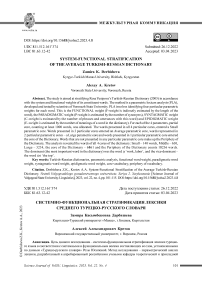System-functional stratification of the average Turkish-Russian dictionary
Автор: Derbisheva Z.K., Kretov A.A.
Журнал: Вестник Волгоградского государственного университета. Серия 2: Языкознание @jvolsu-linguistics
Рубрика: Межкультурная коммуникация и сопоставительное изучение языков
Статья в выпуске: 4 т.22, 2023 года.
Бесплатный доступ
The study is aimed at stratifying Rosa Yusipova’s Turkish-Russian Dictionary (2005) in accordance with the system and functional weights of its constituent words. The method is a parametric lexicon analysis (PLA), developed and tested byscientists of Voronezh State University. PLA involves identifying four particular parametric weights for each word. This is the FUNCTIONAL weight (F-weight is indirectly estimated by the length of the word), the PARADIGMATIC weight (P-weight is estimated by the number of synonyms), SYNTAGMATIC weight (C-weight is estimated by the number of phrases and utterances with this word) and EPIDIGMATIC weight (E-weight is estimated by the number of meanings of a word in the dictionary). For each of the 4 parameters, partial core, counting at least 1000 words, was allocated. The words presented in all 4 particular cores, entered a Small parametric core. Words presented in 3 particular cores entered an Average parametric core, words represented in 2 particular parametric cores - a Large parametric core and words presented in 1 particular parametric core entered the core of the Dictionary. Words that are not presented in any particular parametric core make up the Periphery of the Dictionary. The analysis revealed the words of all 4 cores of the dictionary: Small - 140 words, Middle - 630, Large - 3234, the core of the Dictionary - 6861 and the Periphery of the Dictionary counts 18236 words. The dominant (the most important word in the dictionary) was the word iş ‘work, labor’, and the vice-dominant - the word üst ‘the top’.
Turkish-russian dictionaries, parametric analysis, functional word weight, paradigmatic word weight, syntagmatic word weight, epidigmatic word weight, core vocabulary, periphery of vocabulary
Короткий адрес: https://sciup.org/149143737
IDR: 149143737 | DOI: 10.15688/jvolsu2.2023.4.8
Список литературы System-functional stratification of the average Turkish-Russian dictionary
- Bugaev V.P., 2006. Parametricheskiy analiz tiurkskogo slovaria [Parametric Analysis of Turkish Vocabulary]. Voronezh. 80 p.
- Burlak S.A., Starostin S.A., 2005. Sravnitelno-istoricheskaya lingvistika [Comparative-Historical Linguistics]. Moscow, Akademiya Publ. 432 p.
- Kharitonchik Z.A., 1992. Lexikologiya angliyskogo yazyka [Lexicology of the English Language]. Minsk, Vysshaya shkola Publ. 229 p.
- Kononov A.N., 1997. Tureckiyyazyk v mire: Tiurkskie yazyki [Turkish Language in the World: Turkic Languages]. Moscow, Indrik Publ., pp. 394-411.
- Kretov A.A., 2011. Problemy kvantitativnoy lexikologii slavianskikh yazykov [Problems of Quantitative Lexicology of Slavic Languages]. Voprosy yazykoznaniya [Topics in the Study of Language], no. 1, pp. 52-65.
- Kretov A.A., Voevudskaya O.M., Merkulova I.A., Titov VT., 2016. Edinstvo Evropypo dannym lexiki [Unity of Europe According to Vocabulary]. Voronezh, Izd. dom VGU. 412 p.
- Kretov A.A., 2017. VT. Titov i parametpicheskiy analiz lexiki [VT. Titov and Parametric Analysis of Vocabulary]. Vestnik Voronezhskogo gosudarstvennogo universiteta. Seriya: Lingvistika i mezhkulturnaya kommunikatsiya [Proceeding of Voronezh State University. Linguistics and Intercultural Communication], no. 4, pp. 5-9.
- Kretov A.A., Cherechecha A.D., 2020 Teoreticheskie problemy lexiko-semanticheskoy tipologii (na primere kavkazskikh yazykov) [Theoretical Problems of Lexico-Semantic Typology (On the Example of Caucasian Languages)]. Vestnik Voronezhskogo gosudarstvennogo universiteta. Seriya: Lingvistika i mezhkulturnaya kommunikatsiya [Proceeding of Voronezh State University. Linguistics and Intercultural Communication], no. 1, pp. 6-15. DOI: https://doi.org/10.17308/lic.2020.1/2724
- Kretov A.A., Gasuns M.Yu., Leonchenko VV, 2021. Parametricheskiy analiz «Sanskritsko-russkogo slovarya» VA. Kocherginoy [Parametric Analysis of the "Sanskrit-Russian Dictionary" by VA. Kochergina]. Kogan A.I., Panin A.S., eds. Problemy obshchey i vostokovednoy lingvistiki. Sochetaemost yazykovykh edinits i yazykovye modeli. Pamyati Z.M. Shalyapinoy (1946-2020) [Problems of General and Oriental Linguistics. Compatibility of Language Units and Language Models. In Memory of Z.M. Chaliapina (1946-2020)]. Moscow, Izd-vo RAN, pp. 287-301. DOI: 10.31696/ 978-5-907543-08-9-287-301
- Melchuk I.A., Zholkovskiy A.K., 1984. Tolkovyy kombinatornyy slovar sovremennogo russkogo yazyka [Explanatory Combinatorial Dictionnary of Modern Russian]. Wien, Ges. zur Foerderung slawist. Studien. 992 p. (Wiener Slawistischer Almanach, Sonderband, 14).
- Merkulova I.A., 2018. Lexicheskaya nukleologia slavianskikhyazykov: avtoref. dis.... d-rafilol. nauk [Lexical Nucleology of Slavic Languages. Dr. philol. sci. abs. diss.]. Voronezh. 35 p.
- Semenova I.D., 2018. Parametricheskiy analiz lexiki karachaevo-balkarskogo yazyka na tyurkskom fone: avtoref. dis.... kand. filol. nauk [Parametric Analysis of the Vocabulary of the Karachay-Balkar Language on a Turkic Background. Cand. philol. sci. abs. diss.]. Moscow. 22 p.
- Titov V.T., 2002. Obshchaya kvantitativnaya lexikologia romanskikh yazykov [General Quantitative Lexicology of Romance Languages]. Voronezh, Izd-vo Voronezh. gos. un-ta. 240 p.
- Titov V.T., 2004a. Chastnaya kvantitativnaya lexikologia romanskikh yazykov [Private Quantitative Lexicology of Romance Languages]. Voronezh, Izd. dom VGU. 552 p.
- Titov VT., 2004b. Kritika lingvisticheskikh istochnikov kak razdela lingvisticheskogo prognostitsizma [Criticism of Linguistic Sources as a Section of Linguistic Prognosticism]. Problems of Linguistic Prognosticism, no. 3, pp. 232-274.
- Voevudskaya O.M., 2015. Kontseptsiya ideograficheskogo slovarya osnovnogo lexicheskogo fonda germanskikh yazykov [Concept Ideographic Dictionary of the Main Lexical Fund of Germanic Languages]. Moscow, Nauka Publ., Unipress Publ. 343 p.


